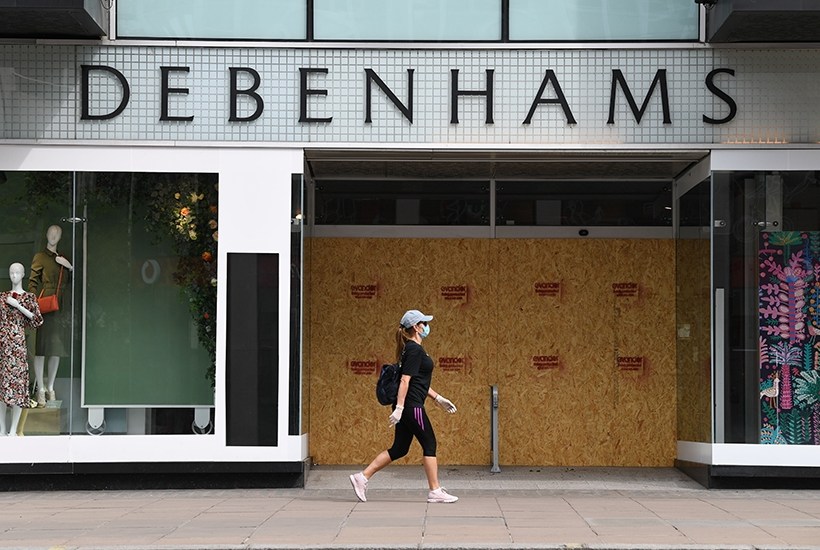Does it matter that Debenhams and the Arcadia group have gone under this week, taking 25,000 jobs with them and leaving large gaps in the high street? In normal times we would be minded to say no. The failure of businesses — large ones, included — is part of a healthy market economy. It is a routine aspect of the renewal process, whereby good upstart businesses drive out tired and stagnant retailers, to the benefit of consumers and employees alike. If unemployment were as low as it was at the beginning of this year, the redundant staff would not have had to wait long, or search far, for alternative employment.
But it is impossible to look at the current shake-out in the high street without seeing that traditional bricks-and-mortar retailers have been dug an early grave thanks to the government’s Covid restrictions. It is true that Debenhams, Dorothy Perkins, Burton and Topshop were failing for a long time, having struggled to get to grips with online shopping (Next and H&M did far better). But, that said, Covid rules could not have been so biased against traditional stores had they been drawn up by Jeff Bezos. In the spring most stores were ordered to close at a stroke, and remained shut for three months while Amazon’s delivery vans were allowed to crisscross the country with abandon.
In June, when shops were permitted to open again, they invested heavily in following government instructions to make their premises ‘Covid safe’. In November, they were ordered to shut again — and are estimated to have cumulatively lost £2 billion a week. Even as lockdown is relaxed, Professor Lucy Yardley of Sage has told the public to spend no more than 15 minutes in a shop.
How is a business supposed to thrive when the government seems to be going out of its way to suppress it and boost its rivals? Even before the crisis, high-street stores were at a huge disadvantage through a business rates regime which, just like Debenhams, has never really got to grips with the internet age. A rate revaluation did help some shops in less buoyant areas, but others found their rates increasing while those for distribution centres fell.
David Cameron pledged to revitalise the high street, but while he let loose Mary Portas to tell towns they needed more coffee shops, he failed to address the real problem: this uneven fiscal playing field between physical shops and their online competitors. Local councils have followed up with their own path of destruction — making it impossible to drive into town centres while failing to provide proper alternatives.
None of this is to say that the government should treat the likes of Dorothy Perkins as heritage assets, to be preserved for posterity. But it is a proper government role to create the conditions in which town centres can thrive. Before Covid this role was being badly neglected, and it still is. The position seems to be one of wilful ignorance.
It would be an exaggeration to say that British towns and cities are heading the way of Detroit, whose centre became a byword for urban wasteland. But dereliction is not a pretty sight. Politically, the government must surely appreciate which side its bread is buttered on: a year ago it won an election by gaining red-wall seats whose residents felt prosperity had passed them by. The high street is emblematic of a town’s health as a whole. If the smell of decay still hangs about them in four years’ time, the Conservatives will struggle to hold those constituencies.
It is not all about shops. Indeed, it would do towns a lot of good if their centres did not remain the retail monocultures they became in the second half of the 20th century. We will need fewer, smaller shops in future, so there will be plenty of space to bring people back to live in town centres, so long as planning policy is flexible enough to permit it. They need to offer experiences — dining, entertainment, nightlife — to draw in the crowds. Transport also needs to be sorted out. For too long, councils have been allowed to milk motorists for parking charges and fines with great enthusiasm, while being far slower to provide public transport or to improve conditions for pedestrians. Now that stores are failing, taking revenue from business rates with them, perhaps councils might wake up to the damage these policies have done.
But more immediately, the government needs to stop punishing shops, cafes, pubs and restaurants through Covid rules laid down without any consultation. The fact that the government was unable to produce a proper cost-benefit analysis for its new tier system sums up its purblind attitude to the wider effects on society and the economy. The Prime Minister cannot ignore the fact that 55 of his own MPs rebelled against him, and he was only saved from an ignominious defeat by Labour abstentions.
The Conservative rebels are not irresponsible, as the government has sought to portray them. They are simply alarmed at the see-no-evil approach ministers are taking to the side effects of these draconian tier restrictions and refusal to even engage in the debate about whether the harm outweighs the good. This week’s 25,000 job losses are only the beginning of what is inevitably going to be a very loud and hefty fallout.
Got something to add? Join the discussion and comment below.
Get 10 issues for just $10
Subscribe to The Spectator Australia today for the next 10 magazine issues, plus full online access, for just $10.
You might disagree with half of it, but you’ll enjoy reading all of it. Try your first month for free, then just $2 a week for the remainder of your first year.














Comments
Don't miss out
Join the conversation with other Spectator Australia readers. Subscribe to leave a comment.
SUBSCRIBEAlready a subscriber? Log in